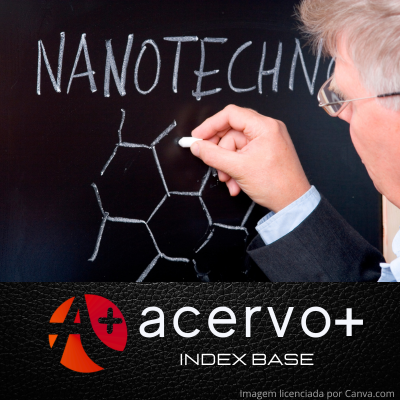A utilização da nanotecnologia no diagnóstico e tratamento do câncer e o impacto na vida do paciente
##plugins.themes.bootstrap3.article.main##
Resumo
Objetivo: Analisar de que maneira a nanotecnologia tem contribuído para o diagnóstico e o tratamento do câncer. Métodos: A abordagem metodológica desse trabalho realiza um compilado de ensaios clínicos, randomizados e não randomizados por meio de uma revisão integrativa da literatura nas bases de dados PubMed e Biblioteca Virtual em Sáude. Os descritores utilizados foram “nanotechnology”, “neoplasms”, “nanoparticles” y “nanomedicine”. Os critérios de inclusão foram estudos observacionais e ensaios clínicos controlados, publicados em inglês, no intervalo de 2019 ao mês setembro de 2024. Resultados: Os resultados demonstram surpreendentemente que o medicamento ayurvedico NSB (Nano Swarna Bhasma) tem eficácia terapêutica significativa, conforme refletido em sua capacidade de controlar/reduzir os volumes tumorais em mais de 80% (durante 60 dias de tratamento; em comparação aos grupos de controle). Considerações finais: Tornou-se evidente a melhora na qualidade de vida e aumento de sobrevida livre em pacientes que utilizaram a via de tratamento acrescentado de nanopartículas e, a respeito de diagnósticos, reunimos métodos que com a utilização de nanotecnologia, tornou-se notório sua eficiência e especificidade quando comparado com exames oncológicos convencionais.
##plugins.themes.bootstrap3.article.details##
Copyright © | Todos os direitos reservados.
A revista detém os direitos autorais exclusivos de publicação deste artigo nos termos da lei 9610/98.
Reprodução parcial
É livre o uso de partes do texto, figuras e questionário do artigo, sendo obrigatória a citação dos autores e revista.
Reprodução total
É expressamente proibida, devendo ser autorizada pela revista.
Referências
2. GRAFALS-RUIZ N, et al. Brain Targeted Gold Liposomes Improve RNAi Delivery for Glioblastoma. International Journal Of Nanomedicine, 2020; 15: 2809-2828.
3. HAFIZI M, et al. A randomized, double-blind, placebo-controlled investigation of BCc1 nanomedicine effect on survival and quality of life in metastatic and non-metastatic gastric cancer patients. Journal Of Nanobiotechnology, 2019; 17(1).
4. KHOOBCHANDANI M, et al. New Approaches in Breast Cancer Therapy Through Green Nanotechnology and Nano-Ayurvedic Medicine – Pre-Clinical and Pilot Human Clinical Investigations. International Journal Of Nanomedicine, 2020; 15: 181-197.
5. KUMTHEKAR P, et al. A first-in-human phase 0 clinical study of RNA interference–based spherical nucleic acids in patients with recurrent glioblastoma. Science Translational Medicine, 2021; 13: 584.
6. LIU J, et al. Graphene-based nanomaterials and their potentials in advanced drug delivery and cancer therapy. Journal Of Controlled Release, 2018; 286: 64-73.
7. LOPUS M, et al. Nano-ayurvedic medicine and its potential in cancer treatment. Journal Of Integrative Medicine, 2023; 21(2): 117-119.
8. SANNA V e SECHI M. Therapeutic Potential of Targeted Nanoparticles and Perspective on Nanotherapies. Acs Medicinal Chemistry Letters, 2020; 11(6): 1069-1073.
9. STRAEHLA JP, et al. A predictive microfluidic model of human glioblastoma to assess trafficking of blood–brain barrier-penetrant nanoparticles. Proceedings of The National Academy of Sciences, 2022; 119: 23.
10. WEI R, et al. Nanoparticle-mediated blockade of CXCL12/CXCR4 signaling enhances glioblastoma immunotherapy: monitoring early responses with mri radiomics. Acta Biomaterialia, 2024; 177: 414-430.
11. ZANONI D, et al. Use of Ultrasmall Core-Shell Fluorescent Silica Nanoparticles for Image-Guided Sentinel Lymph Node Biopsy in Head and Neck Melanoma. Jama Network Open, 2021; 4(3).
12. ZHANG P, et al. STING agonist-loaded, CD47/PD-L1-targeting nanoparticles potentiate antitumor immunity and radiotherapy for glioblastoma. Nature Communications, 2023; 14(1): 23.
13. ZHANG P, et al. Therapeutic targeting of tumor-associated myeloid cells synergizes with radiation therapy for glioblastoma. Proceedings Of The National Academy Of Sciences, 2019; 116(47): 23714-23723.
14. ZHANG X, et al. Combined Chemo- and Photothermal Therapies of Non-Small Cell Lung Cancer Using Polydopamine/Au Hollow Nanospheres Loaded with Doxorubicin. International Journal Of Nanomedicine, 2024; 19: 9597-9612.
15. ZHU R, et al. Current Progress in Cancer Treatment Using Nanomaterials. Frontiers In Oncology, 2022; 12.

